 The
VigilanceVoice
The
VigilanceVoice
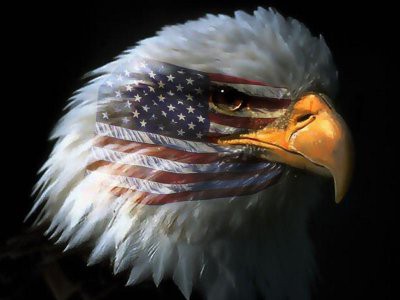
VigilanceVoice.com
Wednesday-- June 5, 2002—Ground
Zero Plus 266
Taxol Terrorism--
Profiting From Cancer's Vigilance

by
Cliff McKenzie
Editor, New York City Combat Correspondent News
GROUND ZERO, New York City,
June 5--Fear and Terrorism take many forms. One of the most
frightening of all is cancer. The knowledge you are being killed
from the inside out, that your body has turned on you, that your cells are
being bombed and blasted and corrupted by cancer, sends a mortal chill
through your soul, rendering you as helpless as the people who looked out
the windows of the Twin Towers on September 11 and saw a jetliner heading
directly toward them.
At least that's how I felt a few years ago
when I was diagnosed with colon cancer. I sat dumbfounded, shaking
my head, saying: "This can't be happening to me! Why me?
Why me?"
Following my bout with cancer, my wife was
diagnosed with breast cancer. She too underwent the same
mortal shock of her body turning against her--of having Terrorists within
her cells, ravaging her, eating her alive.
Both of us had radical surgery.
In my case, the surgeon cut a chunk of my colon off, hoping to carve out
the cancerous cells. In hers, the doctor removed a breast.
Then came the big decision. Did we want to insure the death of
the Terrorists? Did we want to inject Vigilance in our bodies
to destroy any lingering cancer cells that might have escaped surgery,
that might be lurking in our bodies, hiding here or there waiting to
explode again, waiting to rise up in another part of the body?
How could you say no to such
a question?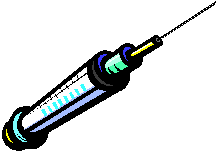
I underwent a year of chemotherapy following
surgery. Each week I went to the oncologists' office and the nurse
stuck a needle in my arm and a toxic poison designed to kill cancer cells
dripped into my arm--slowly--raining destruction on my body's cells in
search of any Terroristic cancer that may be lingering, hiding,
regrouping. Unfortunately, it also attacked healthy
cells--collateral damage it is called--causing sickness and spots before
my eyes and turning my body a yellowish hue.
Then my wife faced a more radical treatment for
her breast caner. It was suggested she take Taxol, a powerful
drug known to aggressively hunt and kill cancer cells, but also leaving in
its wake severe collateral damage such as numbing body parts forever
(peripheral neuropathy),
sickness, hair loss, aching joints, muscle cramps.
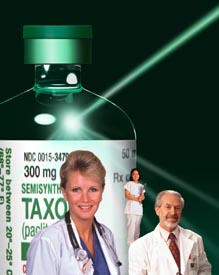 She had little
choice. She underwent the therapy. In solidarity,
when she lost her hair I shaved mine. We walked around bald
together, a couple of cancer signposts. We tried to make the most of
the worst possible situation.
She had little
choice. She underwent the therapy. In solidarity,
when she lost her hair I shaved mine. We walked around bald
together, a couple of cancer signposts. We tried to make the most of
the worst possible situation.
Taxol, the wonder cancer drug, may have
saved her life. No one is sure how well chemotherapy works who
undergo it. It isn't pleasant. If a drop of Taxol gets
on the skin, which occasionally it does, it is like acid. It just
makes sense that anything that potent would kill any cancer cell.
Alternative medicines, while for some miraculous, run the risk of not
working in everyone. Chemotherapy works through destruction.
It becomes the prominent choice.
Taxol treatment--and for that matter, any
chemotherapy--is wildly expensive. In my case, each treatment
cost nearly $1,000. I had 52 of them. My wife's were
more expensive because Taxol comes from the bark of the Pacific yew tree,
an environmentally protected species. It is also one of the slowest
growing trees in the world. (The wood, known not to rot easily, is also
the best for making canoes and bows and arrows.) It takes six
100-year-old tees to provide enough Taxol to treat just one patient.
Luckily, there is another source.
Taxol was also found in the leaves of a European species of ornamental
shrub, Taxus baccata. This required
 much more work
to extract it, but the source was renewable. My wife and I were
lucky. We had good insurance that covered the majority of the costs.
much more work
to extract it, but the source was renewable. My wife and I were
lucky. We had good insurance that covered the majority of the costs.
What we didn't know at the time was that
the drug's manufacturer, Bristol Meyers, was manipulating patent laws to
keep competitors from producing a generic version of the drug, thus
lowering its price and increasing its use among those who couldn't afford
the high cost of its administration.
Recently, one of the network investigative
programs dug deep into the drug companies' history of holding exclusive
patents on certain drugs, warding off generic versions so they could
recover their capital investment in research. Tuft University
had published a study showing it cost $800 million dollars to develop a
new drug. The study was used by the drug companies to defend their
right to exclusive patents, allowing them to recover their research and
development dollars and to profit before the drug went into a generic
mode.
Money generates greed for money.
It's a natural law. So drug companies began
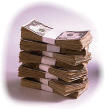 to find loopholes
in the patent laws to extend their exclusive marketing privileges by
filing documents about "new improvements" of the old drug, or setting up
other companies to file for new patents that would be controlled by the
original company--again, staving off the competitors from putting a
lower-priced drug on the market everyone could afford.
to find loopholes
in the patent laws to extend their exclusive marketing privileges by
filing documents about "new improvements" of the old drug, or setting up
other companies to file for new patents that would be controlled by the
original company--again, staving off the competitors from putting a
lower-priced drug on the market everyone could afford.
Taxol is one of those examples.
Yesterday, attorneys general from 29 states
accused Bristol-Myers Squibb of illegally profiting through several
fraudulent schemes to keep lower-priced generic versions of Taxol..
In a lawsuit filed in Federal District
Court in the District of Columbia, lawyers for the states said one scheme
involved collusion between Bristol-Myers and a small California drug
company, American Bioscience, to extend Bristol-Myers's exclusive right to
sell Taxol in the United States.
The reason why Bristol-Myers is fighting
for Taxol exclusive marketing rights is that it generates the company
nearly $1 billion-a-year in sales--its leading revenue generator.
Allowing competitors into the market dramatically reduces that windfall.
Of more concern is the fact that
Bristol-Myers didn't spend $800 million developing the drug. Taxol,
which is known generically as paclitaxel, was discovered by government
scientists at the National Cancer Institute. The government spent more
than $32 million to develop it, according to the states' lawsuit. Later,
the government granted Bristol-Myers the exclusive right to sell Taxol in
the United States for five years, starting when the Food and Drug
Administration approved the drug in December 1992.
The company has found ways to extend that patent,
and the government is claiming it fraudulently did so to keep competitors
out of the market and earned unfair profits at the state's expense, which
underwrote much of the treatment for patients who couldn't afford it.
There is also the concern for those who
were barred from its use because they didn't qualify for state aid and didn't
have sufficient private funds to afford the treatment.
Economically, they were Terrorized by Taxol's price.
Looking at the situation coldly, one could
view the drug companies as "Health Terrorists." They manipulate their patents to suck in as much
money as possible, often at the expense of the marginalized and
underprivileged. In the states case against Bristol-Meyers,
the taxpayers ended up footing the bill by paying excessively for the
exclusively marketed drug.
Terrorists." They manipulate their patents to suck in as much
money as possible, often at the expense of the marginalized and
underprivileged. In the states case against Bristol-Meyers,
the taxpayers ended up footing the bill by paying excessively for the
exclusively marketed drug.
But Terrorism of this type is not just the
privy of drug companies. Recently, Walt Disney slipped a renewal of
its copyright extension for Mickey Mouse and its characters through
Congress. The law for copyrights allows an owner to
enjoy privilege for a number of years, and then the law says that the
property should become public and accessible to all who wish it at
competitive market prices. Disney didn't want just anyone
making copies of their characters, and found a loophole to keep control
over the characters and works it has jealously guarded with licensing
agreements for years. Critics of the "underhanded" copyright
extensions were angry that big companies had the power to protect their
intellectual products while less powerful entities lost such rights.
And, some claim, the world suffers by having limited access to the
information.
It seems to me that Bristol-Meyers is
taking extreme advantage of its power in the case of Taxol. I
arrive at this opinion based on the fact the U.S. Government found the
product and only granted a license not a right to the drug.
There is no question the cost of marketing a drug
is expensive. But when you start out with an $800 million
dollar advantage, and a $1 billion dollar revenue stream, it hardly
justifies acting as though you were the creator of the formula, milking
every last nickel and dime from your investment. Taxol was a
gift to Bristol-Meyers.
As cancer survivors, my wife and I view the
excessive profiting from the Taxol event not unlike those who try to sell
artifacts from the disaster of the World Trade Center.
Recently, the City of New York clamped down on
the use of materials from the site. Many cities and enterprises
wanted to purchase the 1.6 million tons of steel excavated from the site.
It made sense to sell it to recoup the costs. However, some of
the buyers turned the materials into profit centers by riding the
coattails of the disaster. One company made commemorative coins from the metal and
offered them for sale.
disaster. One company made commemorative coins from the metal and
offered them for sale.
Recently, the city demands the buyers sign
a release saying they will not use the materials to profit from the
disaster.
Somewhere in the ethics of business is a
red line. This line is where Humanity stops and Terrorism begins.
Every company decides where that line is. Some move it as
though it were the wind, pushing the envelope to the extreme. These
companies never cross the red line because of its constant self-imposed
flux.
That's what courtrooms are for.
Their job is to establish the red line from a "generic" point of view,
allowing the public to decide whether the accused crossed that line or
not.
Some might feel that the President of
the United States, the FBI, and the CIA were in a conspiracy to keep
Terrorism an exclusive property of the government, and consider them not
unlike Bristol-Meyers, manipulating the right of the public to have access
to "generic information" that would have cut the cancerous Terrorism cells
of Osama bin Laden from America's vulnerable body.
I find it easy to indict any large
organization on the grounds that "power corrupts," and the "people are the
victims" of their selfish greed to control and manage the "little people."
Reading the headlines about Taxol and the story
of Bristol-Meyers makes one think of a bunch of gravediggers sitting
around a boardroom figuring out how much money they can make on some at
the expense of many.  It is the same vision some have of the
President walking around with the knowledge of a time bomb in his pocket,
keeping it a secret until the last minute so he could wage war and not
worry about domestic issues.
It is the same vision some have of the
President walking around with the knowledge of a time bomb in his pocket,
keeping it a secret until the last minute so he could wage war and not
worry about domestic issues.
I have to restrain myself on these issues.
It seems so easy to flow with the "collective conscious" and issue out my
indictments along with everyone else without a thorough and deep
investigation of all issues.
Terrorism does that. It has the habit
of making us think the worst about anyone who "might have an agenda"
different than what we think is "right." How much did it cost
Bristol-Meyers to get Taxol to market? How much liability was
there with marketing the product? How many other products did they
lose money on in their own search for something like Taxol?
Was their attempt to retain patents motivated by sheer greed, or was it a
legitimate effort to retain control within the limits of the law?
Did the men and women who made decisions totally exclude the morality and
humanity of the drug's impact on those who couldn't afford it, or did they
just laugh and look at the bottom line for all their decisions?
Similarly, I must ask the same about our
government. It's hard to imagine a plot among government
officials to quash information about the destruction of American lives or
to imply they have some sinister, evil intent to expose Americans to
Terrorism. But the approach the news media takes is to assume
the worst. It ends up that Terrorism grows with each
indictment, and the faith and confidence in our health and government
institutions weaken a brick here, a brick there, until the entire
foundation wobbles.
As a man who dedicates himself to fighting
Terrorism, I need to caution myself from slashing wildly at any sign of
its presence. The Taxol issue with Bristol-Meyers is an easy
one to go wild on. I could tongue-lash the company, call them
the Osama bin Laden's of cancer. I could attack our government,
making them look like bumbling idiots who jealously hold information to
their chests at the expense of innocent Americans.
But, I believe, that's what Osama bin Laden
wants.
He and other Terrorists love it when we begin to
eat at ourselves, to snarl and rip at one another as though the enemy of
our state was the state itself.
Terrorism after all, is simply an attitude.
It is a result of an opinion. If the opinion is that we are
"victims" then the fallout of that thought is Fear, Intimidation and
Complacency. To overcome Fear we either run or fight.
We either escape the moment or lash out at it.
Right now Bristol-Meyers is in the ring.
We're beating the hell out of it on the grounds it set about to Terrorize
us by holding up access to generic Taxol.
As the Congressional Hearings approach, we will
soon parade the President, CIA and FBI before our internal Inquisition
masters who will carefully chose questions that suggest, imply or infer
some nefarious, clandestine attempt or bungle on government's side to
allow the death of thousands of innocent people.
All the time we are cannibalizing ourselves, the
Terrorists will be busy setting into motion their next attacks.
Each one, they figure, will weaken us internally even more by making us
search for a scapegoat within our ranks. If we can hang someone
within, we don't have to worry about bin Laden's head. The
public will be satisfied it saw blood--that it indicted someone for
anything.
Don't misunderstand. I am not a government
or big business supporter in the sense I accept their actions as being in
the best interests of the public. In both cases, the actions of
government and business are driven primarily by each unit's
stockholders--in the case of government those stockholders are the voters,
and in business, Wall Street and the investment public.
My disdain is not directed at them as much as it is the
News Media, who, in an effort to sell papers or max ratings,
sensationalizes issues without giving both sides of the coin a fair shake.
While the public has a right to know, it also has
a "right of responsibility." As long as the public is
disunified, disjointed, disenfranchised as a whole, it can only rely on
the News Media for its opinions on issues. And, that media
feeds it only the non-nutritious dirt of issues. Looking at
our headlines alone, one would think America a collection of greedy
individualists who, at the top of government and business, ignore the
people and only make decision for votes or profits.
This attitude of "we versus them" will continue
until Americans unite under one collective, ground-level banner.
The Parents of Vigilance is one such way to unite
differences, and to form a political, social and economic block that has
power equal to that of politicians and business.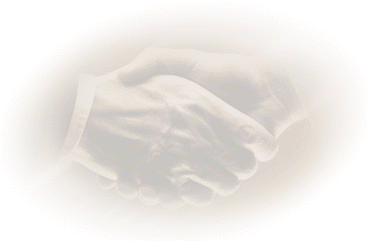
As membership grows among the 100 million
households, a common goal will become the mainstay of the average
person--and that is to quell Terrorism from "within and without."
Government will recognize a body as having the
power of the vote, and be less inclined to act in ways that ignore the
whole. So will business.
By becoming a member of the Parents of Vigilance,
or a Citizen of Vigilance, or a Loved One of Vigilance, you issue to those
businesses and politicians a statement of power. You tell them that
Terrorism of any kind will not be tolerated, and the two tools you have to
fight with include your vote and your dollars.
But such power will lie unused, like pebbles on a
beach, until one by one, each person chooses to become a Parents of
Vigilance or not. If only one out of ten elect that option,
that's 10 million members. That's powerful.
So urge you to take the energy you might want to
spend on indicting Bristol-Meyers or the government, and use it to enlist
in the Parents of Vigilance Corps.
Become a member today.
Let's build a Voice of power that reminds the
Bristol-Meyers and U.S. Governments that "we, the People," represent a
solid front with one goal--to face off Terrorism, to fight its belief in
our vulnerability.
The more Vigilant we are as a whole, the more
chemotherapy we apply to the cancer of Terrorism.




 She had little
choice. She underwent the therapy. In solidarity,
when she lost her hair I shaved mine. We walked around bald
together, a couple of cancer signposts. We tried to make the most of
the worst possible situation.
She had little
choice. She underwent the therapy. In solidarity,
when she lost her hair I shaved mine. We walked around bald
together, a couple of cancer signposts. We tried to make the most of
the worst possible situation.
 much more work
to extract it, but the source was renewable. My wife and I were
lucky. We had good insurance that covered the majority of the costs.
much more work
to extract it, but the source was renewable. My wife and I were
lucky. We had good insurance that covered the majority of the costs. to find loopholes
in the patent laws to extend their exclusive marketing privileges by
filing documents about "new improvements" of the old drug, or setting up
other companies to file for new patents that would be controlled by the
original company--again, staving off the competitors from putting a
lower-priced drug on the market everyone could afford.
to find loopholes
in the patent laws to extend their exclusive marketing privileges by
filing documents about "new improvements" of the old drug, or setting up
other companies to file for new patents that would be controlled by the
original company--again, staving off the competitors from putting a
lower-priced drug on the market everyone could afford.  Terrorists." They manipulate their patents to suck in as much
money as possible, often at the expense of the marginalized and
underprivileged. In the states case against Bristol-Meyers,
the taxpayers ended up footing the bill by paying excessively for the
exclusively marketed drug.
Terrorists." They manipulate their patents to suck in as much
money as possible, often at the expense of the marginalized and
underprivileged. In the states case against Bristol-Meyers,
the taxpayers ended up footing the bill by paying excessively for the
exclusively marketed drug. disaster. One company made commemorative coins from the metal and
offered them for sale.
disaster. One company made commemorative coins from the metal and
offered them for sale. It is the same vision some have of the
President walking around with the knowledge of a time bomb in his pocket,
keeping it a secret until the last minute so he could wage war and not
worry about domestic issues.
It is the same vision some have of the
President walking around with the knowledge of a time bomb in his pocket,
keeping it a secret until the last minute so he could wage war and not
worry about domestic issues.


